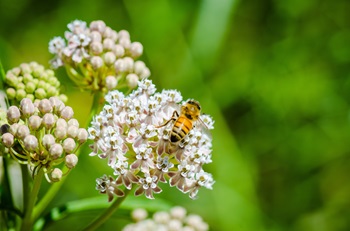Enhancing Farm Resilience and Sustainability Through IPM and Pollinator Protection
By Avery Collins, FMI

Tamara Richardson, founder and principal investigator of Cornucopia Crop Consulting, led a recent SQF digital seminar on sustainable pest management and sustainability audits.
Sustainable pest management practices have benefits, with consumers willing to pay a premium for sustainably produced goods and food retailers such as Walmart, Whole Foods, Kroger, and others increasingly seeking out products to meet consumer desires and requiring their suppliers to adhere to IPM standards as part of their own corporate sustainability commitments.
Richardson emphasized that as sustainability becomes a focal point in farming practices, understanding and supporting pollinators has never been more important. Pollinators, such as bees, butterflies, birds, flies, and bats, play an indispensable role in sustainable agriculture. Their job of pollinating crops is crucial in the production of fruits, vegetables, nuts, and seeds. Pollinators are responsible for an estimated 30% of global food production by volume.
"Pollinators have a significant and invaluable impact on food production globally," said Richardson. "They contribute to it by facilitating fertilization of flowers and better seed and fruit production which translates to more abundant harvest, and greater revenue to a farmer.”
Pollinators face numerous threats that jeopardize their populations and consequently, the sustainability of agriculture. Habitat loss due to urban development, intensive farming practices, and the use of pesticides are major contributors to the decline in numbers.
The SQF Code for Primary Plant Production certification, combined with the new Integrated Pest Management addendum, provides strategies for farmers. SQF certification encourages an actionable framework toward more sustainable management practices and approaches pest control responsibly through an Integrated Pest Management (IPM) system approach. Learn more about the SQF Code for Primary Plant Production certification and how its pest control requirements can provide a structure to strengthen your IPM program.
Four Primary Strategies for Pest and Disease Management:
- Cultural Control: Involves practices that reduce pest establishment, reproduction, dispersal, and survival. Such as crop rotation, planting pest-resistant crop varieties, and altering planting times.
- Biological Control: Utilizes natural predators, parasites, or pathogens to manage pest populations. This method emphasizes enhancing the environment to support these natural enemies.
- Mechanical Control: Includes physical methods like traps, barriers, and manual removal to reduce pest populations. Techniques such as sticky traps and pheromone traps are commonly used.
- Chemical Control: While sometimes necessary, this approach is used as a last resort. The emphasis is on selective pesticides that target specific pests, thereby minimizing broader environmental impacts.
Benefits of Sustainability Certification
- Market Access
- Certification acts as a passport to new markets, especially those where buyers demand proof of sustainable practices.
- Consumers are increasingly willing to pay premium for sustainably produced goods.
- Food retailers, including Walmart, Whole Foods, Kroger, and others are increasingly requiring their suppliers to adhere to IPM standards as a part of their own corporate sustainability commitments.
- Operational Improvements
- Certification involves audit of operations, helping identify areas where resources can be used more efficiently.
- Adoption of sustainable practices helps in risk management, reducing potential future costs related to environmental, social, and governance risks.
- Brand reputation
- Certification demonstrates commitment to responsible practices, enhancing reputation and trust with consumers.
- As sustainability becomes important for investors, certified farms can become more attractive to investment.
Long-Term Impact of SQFI and the Sustainability Addendum
- Practices such as diversified cropping, use of cover crops, and soil conversation methods increase the farms capacity to withstand extreme weather conditions.
- Maintaining healthy soil and diverse ecosystems helps farms better absorb and recover from shocks such as droughts or floods.
- Practices like IPM improve a farms ability to handle pests and diseases.
- Encouraging biodiversity and minimizing use of pesticides helps farms maintain a balanced ecosystem that keep pest populations in check, reducing likelihood of outbreaks.
- Sustainability can lead to improved efficiency and cost savings in the long term.
- Efficient water use, on-site composting, and renewable energy can reduce reliance on external inputs.
- Certification can open up new markets and enable price premiums.
To learn more about implementing Integrated Pest Management and other sustainable practices, listen to our digital seminar on Integrating Pest Management.
Recent Blog Posts
SQF Code Edition 10 represents a critical step forward in ensuring rigorous yet practical food safety management across the supply chain.
In an industry where compliance and operational integrity are nonnegotiable, manufacturers and suppliers need more than just certification — they need a globally recognized solution.
Renee McVey is one of the first industry professionals to hold the Safe Quality Food Institute’s new Certified SQF Practitioner credential, which is administered by Exemplar Global.




